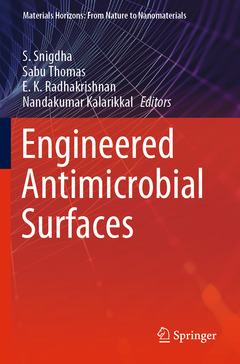Engineered Antimicrobial Surfaces, 1st ed. 2020 Materials Horizons: From Nature to Nanomaterials Series
Coordonnateurs : Snigdha S., Thomas Sabu, Radhakrishnan E. K., Kalarikkal Nandakumar

This volume looks at the different aspects involved in controlling microbial growth and the techniques employed in obtaining sterile surfaces. It covers research on coatings, nano-materials, herbal materials, naturally occurring antimicrobials in designing antimicrobial surfaces. It discusses issues of antibiotic resistance, synthesis techniques, toxicity, and current and potential applications of antimicrobial surfaces, and this book will serve as a useful reference to a broad range of scientists, industrial practitioners, graduate and undergraduate students, and other professionals in the fields of polymer science and engineering, materials science, surface science, bioengineering and chemical engineering.
Snigdha S. completed her Ph.D. at the International and Inter University Centre for Nanoscience and Nanotechnology (IIUCNN), at Mahatma Gandhi University, Kottayam, India, where her research focused on nanostructured materials for microbiological applications.
Sabu Thomas is currently Professor and Pro-Vice Chancellor at Mahatma Gandhi University, Kerala, India. Prof Thomas' research has spanned many areas of nanocomposite and polymer science and engineering, and he has edited more than 70 books, holds 5 patents and has authored over 750 research publications.
Radhakrishnan E. K. is an Assistant Professor in the School of Biosciences at Mahatma Gandhi University, Kerala, India. His research focuses on biological and metabolic processes in bacteria, bioactive compound synthesis, biofilm formation, metal nanoparticles synthesis and thin films for antimicrobial applications.
Nandakumar Kalarikkal, is Professor & Head of the Advanced Materials Laboratory in the School of Pure and Applied Physics as well as the Honorary Director of IIUCNN at Mahatma Gandhi University, Kerala, India. His research focuses on the synthesis, characterization and applications of nanomaterials, phase transitions, and the effect of ion irradiation on novel materials.
Describes antimicrobials and their synthesis, chemistry, engineering and potential applications
Consolidates information across patents and published literature
Includes contributions from leading experts in the field
Date de parution : 05-2021
Ouvrage de 163 p.
15.5x23.5 cm
Disponible chez l'éditeur (délai d'approvisionnement : 15 jours).
Prix indicatif 158,24 €
Ajouter au panierDate de parution : 05-2020
Ouvrage de 163 p.
15.5x23.5 cm
Disponible chez l'éditeur (délai d'approvisionnement : 15 jours).
Prix indicatif 158,24 €
Ajouter au panier


